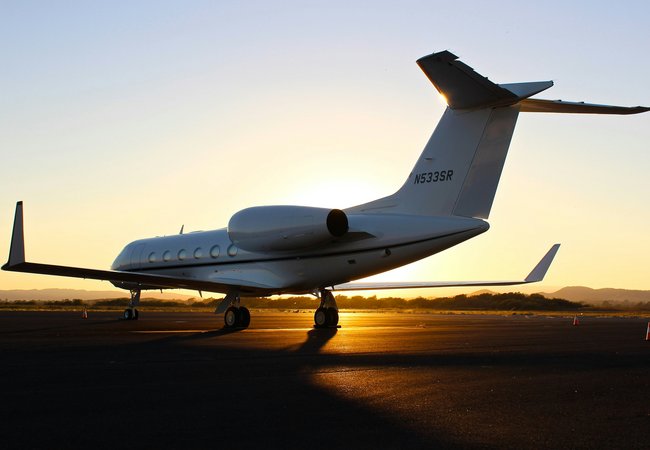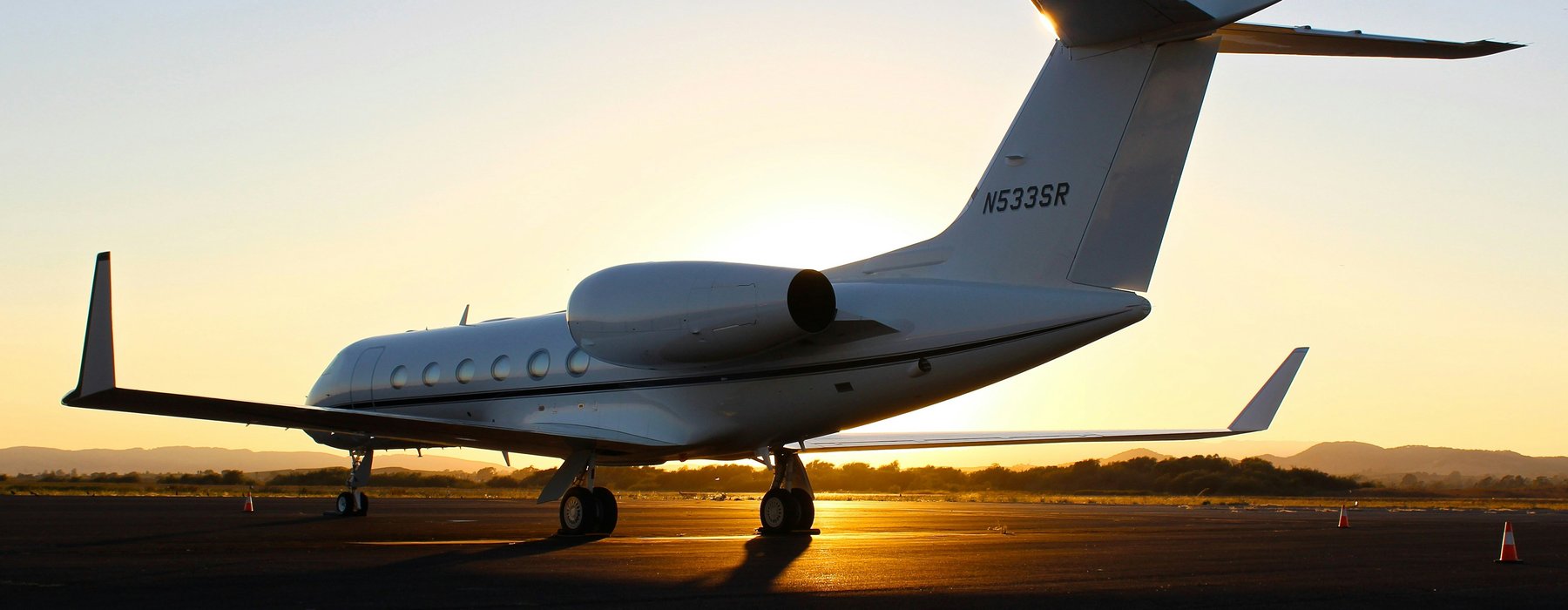


I'm Admin in the United Kingdom
26 Jun, 2025
4 mins read time
An investigation by Oxfam Scotland has revealed the alarming scale of pollution-spewing private jet traffic in Scotland, with Glasgow Prestwick Airport, owned by the Scottish Government, seeing a shocking 32% increase in private jet flights from 2023 to 2024.
Scotland’s busiest airports for private jet use last year were Edinburgh, Glasgow Prestwick, and Inverness, with a total of 12,143 private jet flights in total taking off or landing at Scottish airports in 2024.
Oxfam Scotland says the data reinforces the need for the Scottish Government to deliver a fair tax on passengers who choose to travel by private jets from airports in Scotland.
The investigation reveals that Glasgow Prestwick Airport recorded a significant rise, from 1,845 private flights in 2023 to 2,437 in 2024, with some of the world’s wealthiest people turning up for luxury breaks – including at nearby golf venues.
Oxfam Scotland’s research reveals a major spike in private jet traffic coinciding with a key golfing event, with a 123% surge in flights at Glasgow Prestwick in July 2024 when The Open was held at the nearby Royal Troon Golf Club. This is compared to the 203 average monthly flights in 2024. A total of 453 private jets took off or landed that month, nearly 15 a day, the highest July figure since the tournament was last held at Royal Troon in 2016.
With some high-polluting private jets as much as 20 or even 30 times more carbon-intensive than economy class airline flights, campaigners say this egregious example of excess occurring at an airport owned by the Scottish Government risks further undermining Scotland’s climate credentials.
Oxfam Scotland is campaigning for a Private Jet Tax at both UK and Scotland-levels set at least 10-times the existing Higher rate within the UK Air Passenger Duty. Campaigners estimate that had this tax been in force in Scotland in 2024, it could have raised up to an extra £28,766,431 to invest in green initiatives, such as extending concessionary bus travel to those on low incomes and unpaid carers.
The investigation comes as new figures published this month by the Scottish Government show that while overall emissions in Scotland have fallen year-on-year, emissions from international aviation and shipping have surged by 18.6% as flights and shipping rebound to pre-pandemic levels. Since 1990, emissions from these sectors have risen by a third, dragging down Scotland’s climate progress and highlighting the urgent need to target private jet pollution, as a fair step towards a wider strategy to tackle aviation emissions.
Jamie Livingstone, Head of Oxfam Scotland, said: “Scotland is rightly proud to be the home of golf, but it shouldn’t be a playground for the world’s wealthiest polluters. The fact that Glasgow Prestwick Airport, which is publicly owned, is a destination of choice for those choosing to use private jets should embarrass the Scottish Government.
“While the super-rich rack up air miles, ordinary people are left counting the climate cost - from higher food bills and flooding in Scotland, to hunger across drought-hit Southern Africa. For a government that’s already scrapped a key climate target and diluted vital green policies, continuing to give ultra-wealth polluters an easy ride adds insult to injury.
“The First Minister says he backs landing a fair tax on pollution-spewing private jets, but so far, it’s all talk, no take-off. It’s time he stopped circling the issue and finally land this fair tax on those polluting Scotland’s skies.”
Ahead of the 2024 Open Championship, jet companies openly marketed exclusive flights to the tournament, with one pitching the experience as 'the pinnacle of luxury' and offering 'gourmet catering'. Another promised ‘a serene environment’ and to help fans avoid the 'traditional airport hassles and crowded commercial flights’.
Depending on the type of private plane selected, one company quoted the cost of chartering a private jet as being up to $12,000 (or more than £8,850) per flight hour.
Glasgow Prestwick Airport markets itself as the only Scottish airport in Scotland with a “dedicated executive immigration clearance facility”, guaranteeing passengers will process through the airport “quickly and discreetly”. It boasts a secure VIP lounge, “discreet executive passenger handling service”, and says it can meet passengers’ “unique and culinary requirements”.
Across the 11 years (2014-2024), a total of 24,104 private flights used this airport, nearly 10% of all flights at Glasgow Prestwick. Already in 2025, there were 372 private flights recorded in the first three months to the end of March – up from 298 during the same period in 2024.
Numerous well-known names have been reported to jet in and out of Scottish airports. In March, Donald Trump’s private Boeing 757 plane was spotted at Glasgow Prestwick. It coincided with a visit to Scotland by Eric Trump, who is reported to have visited the nearby Trump Turnberry golf resort. Two days earlier, the plane is reported to have landed at Edinburgh Airport ahead of a meeting with the First Minister in Edinburgh.
But it’s not just Glasgow Prestwick and Edinburgh Airports in the spotlight. Last year it was reported that private jets owned by Scotland’s largest private landowner, Danish billionaire Anders Holch Povlsen, are contributing to high levels of private jet traffic at Inverness Airport – which recorded the third highest figure in Scotland in 2024. Campaigners say this stands in striking contradiction to his claims to champion rewilding and nature at his Highland estates.
Across all airports in Scotland, there have already been 1,711 private flights in the first three months of 2025 – more than 19 every day.
With the Climate Change Committee stating that aviation emissions account for 4% of Scotland’s total, up 20% since 1990, Oxfam Scotland says cutting demand for the most polluting forms of travel is essential. A fair tax on pollution-spewing private jets is a no-brainer first step. Campaigners are calling on the Scottish Government to include firm action in its Just Transition Plan for Transport – currently being finalised – to make sure the richest pay their share for the damage being done.
Oxfam Scotland says the power to act already rests in Edinburgh. Back in 2017, the Scottish Parliament passed legislation to introduce its own devolved Air Departure Tax (ADT). Yet despite years of delay – and First Minister John Swinney recently saying he is “very supportive” of a Private Jet Tax – the Scottish Government has so far failed to implement it.
Campaigners say there is nothing stopping Scottish Ministers from bringing in the new ADT in a way that protects vital connections for people in the Highlands and Islands, while cracking down on the worst emissions excesses, like private jet travel.
The call for a Private Jet Tax is supported by Stop Climate Chaos Scotland, which brings together over 70 civil society organisations campaigning together on climate change.
Becky Kenton-Lake, Stop Climate Chaos Scotland Coalition Manager, said: “People in Scotland want our political leaders to invest in fast and fair climate action. A Private Jet Tax would help hold the biggest polluters accountable and raise vital funds to protect us all from the damage they’re causing. Ministers have the chance to lead boldly, and Scotland is counting on them to deliver.”
/ENDS
For more information and interviews, please contact: Rebecca Lozza, Media and Communications Adviser, Oxfam Scotland: rlozza1@oxfam.org.uk / 07917738450
Notes to Editors
- Access Oxfam Scotland’s methodology note here: https://oxfam.box.com/s/gu36mv91cgjjwvsg3wmeh3frjv0cktm0
- Read Oxfam Scotland’s 2024 report, Cleared for take-off: a private jet tax for Scotland.
- The Scottish Government bought Prestwick Airport for a nominal price of £1 in November 2013 and it operates as a “commercial business at arm’s length from the Government”.
Urge Scotland's Cabinet Secretary for Finance and the UK Chancellor to use their respective powers to introduce a Private Jet Tax: https://bit.ly/TaxLuxuryTransport